
The first passage discusses the beers brewed by Phipps in Northampton. The author worked as an engineering apprentice between 1950 and 1956.
"During my time there Phipps were producing:
PA and IPA draught and in bottles
Ratcliffs Stout in bottles
Number 10 barley wine in nip bottles (third of a pint)
Brown Ale in bottles (a blend of PA and Ratcliffs Stout)
Bottling Guinness under contract from Park Royal.AK draught for internal consumption (allowance beer)
AK was the workers allowance beer and of low gravity between 1030 and 1032. In relation to its gravity it was over hopped and very palatable when consumed with bread and strong cheese. It was said to be a product that had been specifically brewed for farm labourers to drink during harvest time! In addition to allowance beer it might have been sold commercially as SPA for special outdoor events, village fetes & galas, etc."Tom Whapples, Phipps' Brewery Engineer describes the Bridge Street plant.http://phipps-nbc.co.uk/6.html
It's interesting that it's called an "allowance beer", that is beer given to workers as part of their employment terms. It was common in the 19th century for farmers to partly pay their workers in beer, especially at harvest time. Harvest beers were weaker than standard pub beers. The ones I've seen in price lists were usually 10d a gallon, which equates to a gravity of no more than 1045º.
A dictionary of Lancashire dialect has this entry:
"Lowance – allowance (Ale drunk at harvest time)"
http://dunkerley-tuson.co.uk/glossarylancsdialect.aspx
confirming the use of the term "allowance" for beer given to harvesters.
Not only agricultural workers received beer as part of their pay. Those performing certain types of heavy industrial work got beer, too. This is a recollection written in 1936 by Robert Greenhalgh of Atherton, Lancashire, who had been born in 1855:
"At the period I am writing about, the houses could be open all the hours of the week, night and day. I well remember an incident that occurred in my apprentice days just after the restriction of the 11 o'clock closing time. We were repairing a colliery winding engine which had broken down and, as was usual in those days, the manager sent one of the labourers with a two gallon bottle for the allowance beer to the Bull & Butcher at Dangerous Corner just before closing time."
http://www.nyt.co.uk/athertonhistory.htm
(I love the idea of a pub called the Bull & Butcher at Dangerous Corner. I wonder if it still exists?)
Here's Mike's basic point: could the A in AK be derived from "Allowance"? It certainly fits with AK being lighter than other beers. And I can't say that I have a better theory. What do you reckon?


























































































































